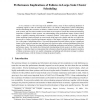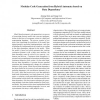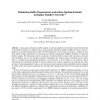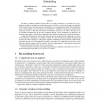118 search results - page 22 / 24 » Compositional real-time scheduling framework with periodic m... |
103
click to vote
JSSPP
2004
Springer
15 years 5 months ago
2004
Springer
As we continue to evolve into large-scale parallel systems, many of them employing hundreds of computing engines to take on mission-critical roles, it is crucial to design those s...
RTAS
2003
IEEE
15 years 5 months ago
2003
IEEE
Model-based automatic code generation is a process of converting abstract models into concrete implementations in the form of a program written in a high-level programming languag...
DATE
2004
IEEE
15 years 3 months ago
2004
IEEE
A distributed sensor network (DSN) designed to cover a given region R, is said to be alive if there is at least one subset of sensors that can collectively cover (sense) the regio...
106
click to vote
VLSISP
2002
14 years 11 months ago
2002
Large-grain synchronous dataflow graphs or multi-rate graphs have the distinct feature that the nodes of the dataflow graph fire at different rates. Such multi-rate large-grain dat...
100
click to vote
MEMOCODE
2006
IEEE
15 years 5 months ago
2006
IEEE
The theory of latency-insensitive design (LID) was recently invented to cope with the time closure problem in otherwise synchronous circuits and programs. The idea is to allow the...




